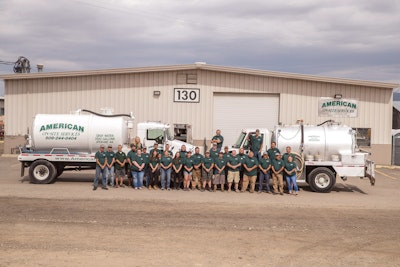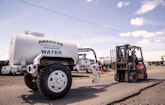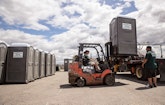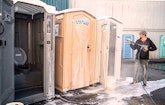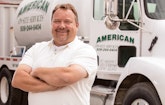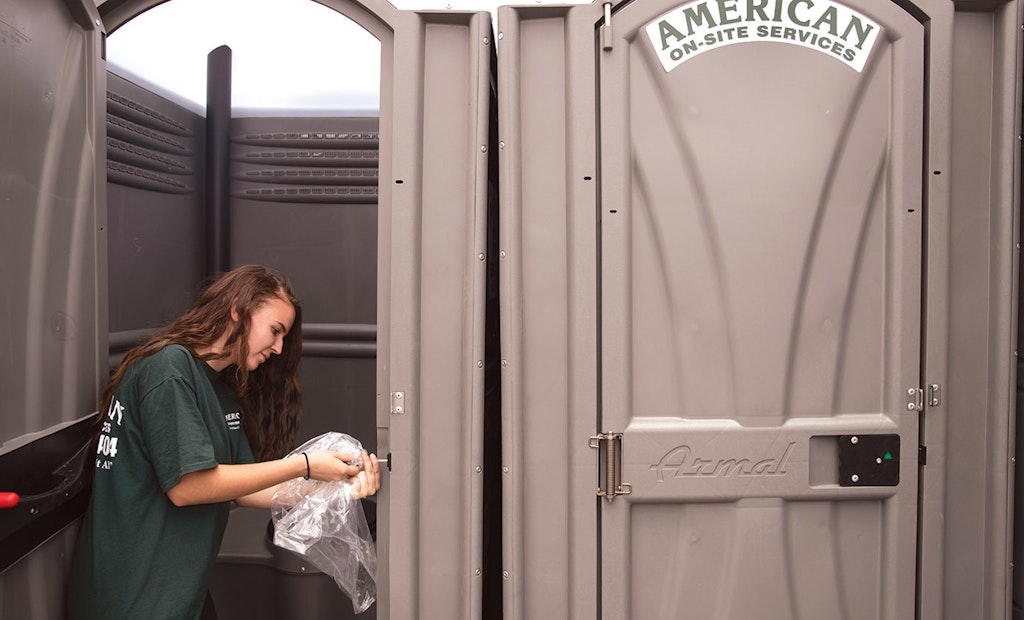
Nikki Aubrey, yard worker, provides maintenance for Armal restrooms before they are sent out to the next customer.
There are times when going head-to-head with a strong competitor yields more than just a race to the bottom on pricing. For an example, consider American On-Site Services, which took an unexpected path to becoming a large regional player in eastern Washington and the Idaho Panhandle after years of strong competition with an archrival.
After playing to a stalemate while vying for market share in eastern Washington, the competitor, Honey Bucket (a subsidiary of Northwest Cascade), asked the owners of Spokane-based American On-Site Services — brothers Ted and John Condon and Jack Gillingham — if they were interested in buying its northern-Idaho portable restroom branch.
The partners agreed to the deal, which occurred in 2014 and offered the proverbial win-win situation: Honey Bucket (which now serves customers throughout California, western Oregon, Utah and western Washington) used proceeds from the sale to invest in other markets. At the same time, American On-Site Services became a bigger player in eastern Washington and without always butting heads with Honey Bucket, Ted Condon explains.
“Honey Bucket expanded by taking the funds and reinvesting in other markets, and we were able to take on the majority of this market and maintain decent profit margins in doing so,” he continues. “This is a real benefit to the end user because customers want the best experience while doing business, and this sale allowed us to upgrade our fleet of portable restroom. We also bought equipment that previously was unavailable in this market, such as shower trailers, hot-water sink trailers and high-end restroom trailers, which gives customers more options.”
At times, American On-Site Services still collaborates with Honey Bucket on large contracts. “If they happen to have a national account that needs something in eastern Washington, we’ll do it with them,” says Condon, 47. “We also supply each other with equipment, if needed. In effect, we gained a friend and lost a foe.”
The takeaway? While competition always is good, being deadlocked isn’t — especially if lowballing on prices is the only way to break the impasse, Condon says. And in the end, both parties realized they could be better off by heading in different — and more profitable — directions.
COMPETITION REMAINS
When interviewed for a Pumper magazine article 16 years ago, Condon said he didn’t expect the company to grow much bigger. “At the time, we were very profitable and Honey Bucket was a direct competitor,” he says. “And there wasn’t even a thought that they’d sell their restroom division.”
But through the acquisition, American On-Site Services actually doubled its revenue. The lesson for other wastewater service companies? Be ready to take advantage of unexpected opportunities. “They’re always out there at all times,” he says.
That’s not to say competition automatically decreased after the acquisition. While two large competitors in one regional market had made it difficult for others to enter the market, having only one large competitor motivated others to emerge. As such, American On-Site Services now has one direct competitor in Spokane and a total of seven within its service area, approximately a 75-mile radius around Spokane and Coeur d’Alene, Idaho, Condon says.
“I believe we’re on good terms with our competitors,” he says. “We talk to most of our competitors several times a year. We like to keep the lines of communication open.” That creates a business environment in which American On-Site Services sometimes rents restrooms from a competitor or rents restrooms to a competitor at a discounted rate. “This allows us or competitors to take care of a customer and rent out equipment that otherwise might be sitting in the yard that weekend,” he explains. “Sometimes we even have rented equipment such as restroom trailers or toilet-hauling trailers to competitors — whatever is needed to take care of a customer.”
SERVICE SELLS
Facing heavy competition, providing good service is essential to success. And proper hiring and training of front-line workers is necessary to ensure consistent quality service, Condon says.
“It’s difficult because you’re totally at the mercy of the employees,” he adds. “If they don’t buy into the philosophy that service is key and they lack either the confidence or the ability to properly service customers, you’re going to lose customers. Whether you own 100 or 5,000 restrooms, bad service affects everyone the same way. So service is the key to the whole thing.”
American On-Site Services thoroughly trains employees before they’re allowed to go out on routes by themselves. But Condon notes that if an employee doesn’t have the right work ethic and the drive to apply what they’re taught, it’s all for naught. As he puts it, “You can only explain so many times how to clean a restroom the right way.”
The company reinforces good customer-service practices by employing two field customer-service reps and two field supervisors and using GPS technology to monitor employees’ whereabouts and driving habits. Yet despite all that, service technicians can still clean restrooms poorly. And when they do, acting fast on customer complaints is critical to maintaining a good reputation, Condon says.
“Generally speaking, we do our best to respond to any complaint within an hour,” he says. “It’s very difficult to do. But if a customer calls in a complaint, we usually can have a service vehicle and a supervisor there in an hour. Although we try our best, we can’t keep 100 percent of our customers happy all the time. But if you show you’re willing to address problems, that goes quite a long way with customers.”
EQUIPMENT INVENTORY
Investing in quality restrooms and equipment also bolsters customer service. The company owns about 4,500 restrooms, primarily from PolyJohn, Satellite | PolyPortables, Armal and Five Peaks; roughly 150 single and double PolyJohn and Satellite | PolyPortables hand-wash stations; seven restroom trailers from Ameri-Can Engineering, JAG Mobile Solutions, Advanced Containment Systems, Comforts of Home Services and Wells Cargo; and two shower trailers from Ameri-Can Engineering and JAG Mobile Solutions.
American On-Site Services owns 25 service trucks. That includes 13 larger pump trucks; they’re typically built on International chassis with steel or aluminum tanks that range in size from 500 gallons of waste and 200 gallons of freshwater to 1,100 gallons of waste and 350 gallons of freshwater. All the trucks feature either Masport or Conde (Westmoor) pumps. The tanks were either built in-house or by Erickson Tank & Pump, Progress Tank and FMI Truck Sales & Service (WorkMate models).
The company also relies on 12 rental trucks formerly from The Home Depot (Ford F-250 and F-350 flatbed pickups), converted for pickup and delivery and with stainless steel slide-in tanks that are either self-fabricated or built by Best Enterprises. The tank sizes range from 300 gallons waste and 100 gallons of freshwater to 200 gallons of waste and 65 gallons of freshwater. The trucks are equipped with Masport and Conde pumps.
“The Home Depot turns its trucks every couple years, and they’re just exactly what we wanted,” Condon explains. “The aluminum beds are very durable. We put little Tommy Gate lifts (built by Woodbine Mfg. Co.) on them, so there’s less stress on our workers.”
The company also owns two vacuum trucks dedicated to pumping septic tanks. American On-Site Services built out the trucks, one on a Kenworth T300 chassis equipped with a 2,500-gallon steel tank and the other on a GMC TopKick featuring a 2,200-gallon steel tank. Both tanks were fabricated in-house, and both trucks feature Masport pumps.
In addition, the company owns approximately 72,000 linear feet of temporary chain-link fencing; 4,800 linear feet of barricades made by Master Halco; eight- and 12-basin, self-fabricated wash stations (generally used at disaster sites, such as forest fires, as well as at fairs and festivals); about 100 20- and 40-foot shipping containers rented out for job site storage; and several three-basin, stainless steel, hot- and cold-water kitchen sinks made in-house for food events. Furthermore, American On-Site Services owns six 400-gallon freshwater trailers, made by Turtle Mfg. and used to supply water at special events and on construction sites.
SLOW AND STEADY
Looking ahead, Condon makes the same prediction he made so many years ago: little growth on the horizon. But he tempers that prediction with the knowledge that it’s always possible to encounter unexpected business opportunities.
“In the restroom business, we’re buckling down and focusing on what we have on hand,” he says. “We’re focused on educating employees so they can provide the best service possible. As far as growth goes, we’re pretty content where we are now.
“But we might expand some more into disaster-relief services. … Maybe we’ll go from two shower trailers to 50,” he continues. “There’s potentially a lot of growth in that end of things with so many forest fires occurring.
“We have a good, strong foothold in portable restrooms in our region, but there’s some room for expansion in specialty services,” he adds. “But we’ve got no real plans — we’ll just have to see what happens.”
Attract and retain employees
Ted Condon would love to report he’s found the secret to attracting and retaining employees at American On-Site Services. But like so many wastewater company owners nationwide, the co-owner is still looking.
“It’s very difficult to find and retain the perfect employee,” he says. “There are so many factors at work.”
American On-Site Services uses a variety of strategies to minimize employee turnover, including offering winter jobs at other companies to avoid seasonal layoffs. “Year-round work is a key thing,” he says. “There’s a Christmas tree company I used to own that they can work for, as well as positions at Northwest Industrial Services (a garbage-hauling and scrap-metal-recycling business Condon owns with his brother, John Condon, and Jack Gillingham) and Barr-Tech (a green- and food-waste composting business Ted Condon co-owns with Gillingham). We always need employees.”
Condon also offers employees what he calls a work-study program in which they work as many hours as they can or want to per week at Barr-Tech in exchange for the company paying for up to $5,000 of their children’s tuition at a local private school. “Some parents have other jobs or they’ve lost jobs,” Condon says. “If they have other jobs, they work on weekends. They do everything from sweeping floors to picking up garbage. There are no minimum hours required … but the more they work, the more of their kids’ tuition we pay.”
American On-Site Services also pays competitive wages; provides medical and dental insurance, with the company picking up a portion of the premiums; offers paid vacation time; and makes available SIMPLE IRA retirement plans, with the company matching a percentage of employee contributions. The latter is attractive to employees because they can manage their own retirement investments and the plan is “portable,” in that employees can retain it even if they leave the company, Condon says.
“We also take employees to family nights at sporting events or hold an amusement-park outing for them and their families,” he adds.
Condon also promotes professionalism whenever possible because it helps reduce turnover if employees feel their work is valuable. The company provides field employees with uniforms as well as a cleaning service to wash them. “Uniforms give them a sense of ownership in their world — makes them feel more professional,” Condon says.
The company also provides ongoing safety and service training in the hope that it protects employees and improves customer service, reducing turnover as employees appreciate when the company invests in them. “It helps, but our turnover still is fairly high,” Condon says. “Some people go on to bigger and better things, which I have no issue with. We just provide what we can and hope for the best.”
